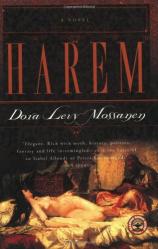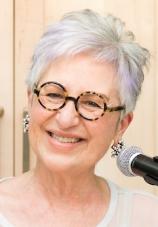Reading Group Guide
Discussion Questions
Harem

1. Set in the Jewish Quarter of Ancient Persia, Harem follows the lives of three generations of courageous and cunning women -- Rebekah; her daughter, Gold Dust; and her granddaughter, Raven -- who are determined to realize their dreams despite the limitations of their forbidding society. How do those limitations change over the course of the novel? How do their dreams differ? How successful is each woman in achieving her dreams?
2. At the opening of the novel, Rebekah of the violet eyes heard a voice that would haunt her the rest of her life. As she hugs her doll, tossing on her pallet suspended between wakefulness and sleep, ten-year-old Rebekah is captivated by the stranger with a voice like music, who she is convinced will be chosen as her future husband. In a sense it can be said that Rebekah falls in love at first sound. What does the man's voice represent for her? Why do you think Rebekah's dying mother believed she was choosing a better future for her daughter by choosing Jacob the Fatherless? Do you think the stranger continues to inhabit Rebekah's fantasies more because of the brutality of her marriage, or because Rebekah and Rouh'Allah the Spirit of God are fated to be together?
3. Alarmed by the growing madness she can see in her husband's eyes, Rebekah yearns to escape. Yet when Jacob slyly tells her she can leave but reveals that her mother is dead, she elects to stay. Why? "You've nowhere to go. I'm your only hope," he taunts her. Is that true? You are a weakling, afraid of freedom, Rebekah, she taunts herself. Is that true? What choices does she realistically have? Why, when she becomes pregnant, does Rebekah fear having a son? Why do you think she sees giving birth to a girl as a sign that God has forgiven her? What was your reaction to Rebekah's deliberate goading of her increasingly delusional husband into flinging himself into his flaming kiln in an attempt to make himself immortal? Was there any other way to free herself and Gold Dust from Jacob's violence?
4. With no family and no money and a child to care for, Rebekah eventually sells her favors to carefully selected, mostly wealthy, men. When her daughter, Gold Dust, hears the names her mother is called and asks what a whore is, Rebekah replies: "A whore is a woman who has the honor to sacrifice her body and soul for the comfort of her child." Do you agree or disagree with Rebekah that there can be honor in becoming a "whore"? Why? Does she believe she had other choices? Do you think she did?
5. Even though Gold Dust has announced her own intention to marry the acrobat Soleiman the Agile, Rebekah still insists on choosing a husband for her. Discuss the irony of Rebekah following the path that made her feel so betrayed by her own mother. Rebekah is sure she can choose more wisely than her mother did. Instead of selecting the wealthiest suitor, she will search out the most educated bachelor in the Jewish Quarter. Wisdom, she had decided, granted a man confidence and ease in his relationships with women. Illiterate men like Jacob made up for their ignorance by stifling a woman's soul. Do you think this is true? Why or why not?
6. When Rebekah visits the merchant Rouh'Allah the Spirit of God in an attempt to arrange a match between her daughter and his son, she discovers that the father is the man with the voice that haunts her. Discuss the irony of Rouh'Allah turning down Rebekah's daughter for his son the way her mother had turned him down as a husband for Rebekah.
7. Unable to secure a suitable husband for Gold Dust, Rebekah turns to the world of the harem as the perfect solution for her daughter's life. How do you think Rebekah is influenced by her own view of marriage, which she has described to Gold Dust as "an alliance to enslave and shame women"? How is her choice for her daughter influenced by the knowledge that if Gold Dust is admitted to the harem, she, Rebekah, will no longer have to earn her living as a whore? Did the world of the harem in fact offer Persian women of that time advantages they could not gain elsewhere? Did the exotic, conspiratorial, mysterious world of the harem portrayed by the author seem enticing to you? Why or why not?
8. How does Gold Dust's life in the harem change once she becomes the chosen one? How does she learn to cope with stares that stab like daggers and words that poison like hemlock? When her mother visits, she shares with her daughter the secrets of men, the hidden weaknesses of kings, and the power of the heart over the body. "Seek power but don't let it cloud your humanity," her mother cautions. "Men are fickle; they come and go. You and only you must remain the ruler of your heart; that's the secret to survival," Rebekah reminds her. And she adds: "In the end, life is judged by highlights not by days." What does she mean? Do you agree or disagree? Why?
9. Gold Dust gets rigorous training in palace etiquette, dance, poetry, music, and Islamic culture, but it is palace gossip and lessons in the art of lovemaking from the eunuch Hazel Boy that help to set her sights on a new ambition: to become queen. How does Gold Dust plan to advance her power in the court? When she gives birth to the child who she is convinced will be heir to the throne and it turns out to be not the Shah's first son, but an albino daughter, how does Gold Dust manage to get the king to accept this odd-looking but very beautiful girl child? And how does their extraordinary daughter, against all reason named Raven, capture her father's heart?
10. While Raven's teaching the Shah to see women as equals may strike many modern readers as admirable (told by her father when she is twelve that the law doesn't allow a woman to rule, Raven's hard-to-refute logic says simply: "You are the king. Change the law."), her lack of compassion alarms both of her parents. "Is it true that you planned the execution of two men and wanted their hands cut off?" Gold Dust confronts her. When Raven gleefully responds, "Next time I'll be less lenient," Gold Dust prays that the late shah's madness has not flared with even more intensity in her daughter. What do you think of Raven? How do you think the author intends the reader to view her?
11. Suffocating in the Shah's dark moods and melancholy lovemaking, afraid of her own daughter, Gold Dust yearns for Soleiman the Agile, the acrobat whose love-stricken eyes have thrived in the fertile land of her imagination. "How can you toss away your dream?" Rebekah chastises her. But Gold Dust will not be deterred. "Even if they hang me from the tower, I must meet Soleiman." Even though she agrees to help Gold Dust, Rebekah secretly plans to thwart the meeting. Rebekah clearly loves her daughter and wants her to be happy. Yet still she is willing to sabotage her desires. Do you know women like Rebekah -- who would manipulate their grown children's lives if they had the opportunity to prevent what they view as a major mistake? Do you think they have the right? Only when she fears for her daughter's survival does Rebekah show a willingness to help Gold Dust as she wants to be helped. How do you think the author expects us to react to the clash between mother and daughter?
12. Under threat of invasion by the legendary Tartar warrior Teymour the Lame, the Shah readies to lead his men into battle. Intoxicated with his new goal, his body vibrating with new ardor, the king makes love to Gold Dust. As she yields to their love-tussle, Soleiman the Agile lodges deeper and deeper into her soul. And as the shah lies in Gold Dust's arms, it is Raven, who occupies his dreams. But it is not until he is back from war that the undercurrents of incest in the bond between father and daughter come to fruition in the cries of a king rendered helpless by the enormity of his desire. Given the strength of the taboo against incest, did reading about their passion make you uncomfortable? What are we to make of their strange, forbidden relationship?
13. When the Shah learns of Gold Dust's infidelity, he orders her executed. Hazel Boy tries fussily to convince the Shah that the accusations are lies. He struggles to understand such violent jealousy. How could the Shah end Gold Dust's life simply because she has fallen in love? Had he not shared his king with hundreds of sultanas and rejoiced at his pleasure? Is jealousy different for a half-man? the eunuch wonders. Did true men react differently? What about women? How did Gold Dust and the other sultanas feel about sharing the Shah? And Honey? She was like him, half-woman, half-man, desiring other women, weeping when a lover was indifferent, but having the generosity to forgive. What do you think determines how possessive a person is in a relationship? Is sexual jealousy a necessary component of passion? Do people who are generous in other areas of life take a more generous and forgiving approach to infidelity than those who are less generous?
14. John Rechy, author of the bestselling classic City of Night, praises Harem as an "epic novel that teems with sharply drawn characters and haunting scenes." Novelist Ann Rowe Seaman calls it "an intensely visual book, written in scenes like an exotic movie." And novelist Maureen Connell finds "the despair, danger, and erotic life of the Seraglio stunningly portrayed." Do you agree or disagree with these assessments? Why?
15. How much did you know about the harem before reading this book? As she researched this novel, author Dora Levy Mossanen found herself powerfully drawn into the intimate and secret dealings of the sultanas. "I studied the psyche of women whose lives revolved around the one night the Shah might invite them into his bed and about their sexual relationships with eunuchs who were supposed to be their guardians. I found myself lost in these women's tormented worlds of smoke and opium and poisons. I studied different forms of castration and how the process physically and psychologically scarred the eunuchs." Does the author succeed in communicating her own fascination with this world? Does her novel make you want to learn more about life in the harem?
Harem
- Publication Date: July 30, 2002
- Genres: Fiction
- Paperback: 384 pages
- Publisher: Touchstone
- ISBN-10: 0743230213
- ISBN-13: 9780743230216








